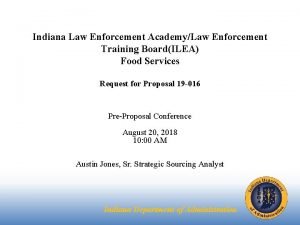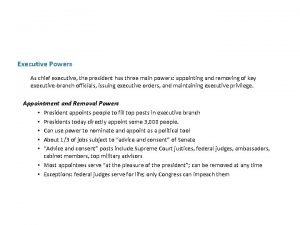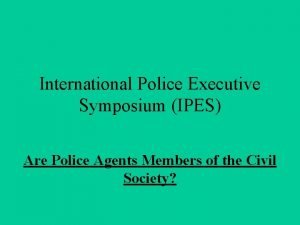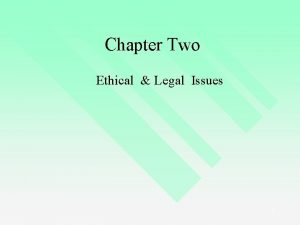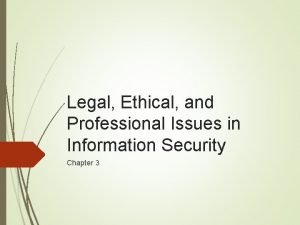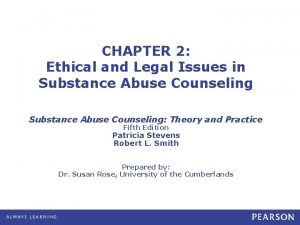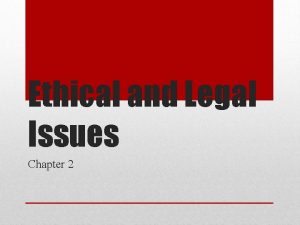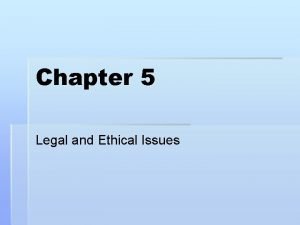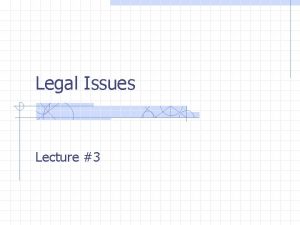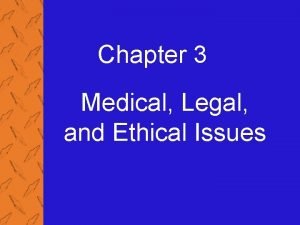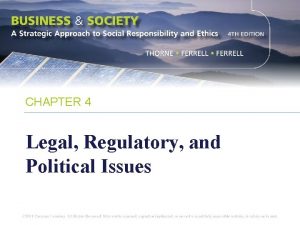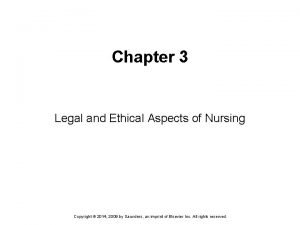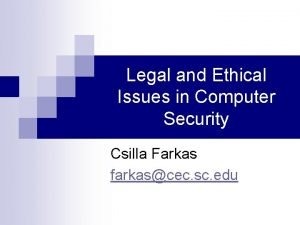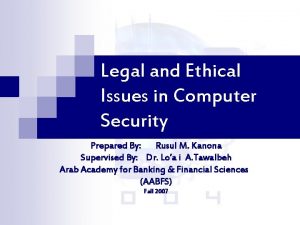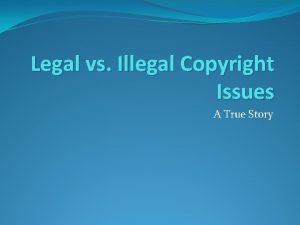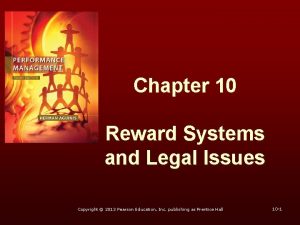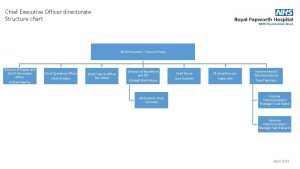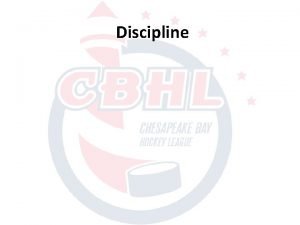Police Discipline Legal Issues ILEA Police Chief Executive






































- Slides: 38

Police Discipline Legal Issues ILEA Police Chief Executive Training Course Tim J. Cain, J. D. , M. B. A. , LL. M. ILEA Staff Attorney

Who Am I? �B. A. 1980 Indiana University - Bloomington �J. D. 1984 Valparaiso U. School of Law �M. B. A. 1991 Indiana Wesleyan University �LL. M. 2001 John Marshall Law School �La. Grange County Prosecutor 1991 -2002 �Reserve Deputy Noble County Sheriff’s Department 2007 -2016 �Over 100 jury trials in State and Federal Courts

Course Objectives At the conclusion of this course of instruction the student will be able to: 1. State the 10 statutory bases for the discipline of LEOs; 2. State the 1 statutory basis that may not be used for discipline; 3. State the 8 items of information that should be included in the notice of discipline, demotion, or dismissal;

Course Objectives At the conclusion of this course of instruction the student will be able to: 4. State the 8 items of information that must be included in the notice of hearing; 5. State the procedural steps in a LEO evidentiary hearing; 6. State the 3 bases for exclusion of evidence in a LEO evidentiary hearing;

Disciplining LEOs Indiana Code § 36 -8 -3 -4 provides the framework for the discipline of law enforcement officers in Indiana. The 10 statutory bases for disciplining LEOs are: 1. Conviction in any court of a crime; 2. Neglect of duty;

Disciplining LEOs Indiana Code § 36 -8 -3 -4 provides the framework for the discipline of law enforcement officers in Indiana. The 10 statutory bases for disciplining LEOs are: 3. Violation of department SOPs; 4. Neglect or disobedience of orders;

Disciplining LEOs Indiana Code § 36 -8 -3 -4 provides the framework for the discipline of law enforcement officers in Indiana. The 10 statutory bases for disciplining LEOs are: 5. Incapacity; 6. Absence without leave;

Disciplining LEOs Indiana Code § 36 -8 -3 -4 provides the framework for the discipline of law enforcement officers in Indiana. The 10 statutory bases for disciplining LEOs are: 7. Immoral conduct; 8. Conduct injuries to the public peace or welfare;

Disciplining LEOs Indiana Code § 36 -8 -3 -4 provides the framework for the discipline of law enforcement officers in Indiana. The 10 statutory bases for disciplining LEOs are: 9. Conduct unbecoming an officer; and 10. Any other breach of discipline.

Disciplining LEOs The one statutory reason that may NOT be used as a basis for LEO discipline: Politics!

Chief’s Authority to Discipline I. C. § 36 -8 -3 -4(c): A chief may suspend a LEO up to 5 days without pay. Any suspension without pay exceeding 5 days requires action by the safety board.

Board Procedure to Discipline I. C. § 36 -8 -3 -4(c): Board must send written notice of suspension, demotion, or dismissal before chief’s suspension expires. The notice of suspension, demotion, or dismissal should include certain information: -Date of the notice; -Specification of the crime(s) or SOP(s) violated;

Board Procedure to Discipline I. C. § 36 -8 -3 -4(c): The notice of suspension, demotion, or dismissal should include certain information: -Date of the notice; -Specification of the LEO’s conduct; -Statement that the LEO may request an evidentiary hearing; -A warning that the request must be received within 5 days; - A statement that the hearing will be held within 30 days of the request;

Board Procedure to Discipline I. C. § 36 -8 -3 -4(c): The notice of suspension, demotion, or dismissal should include certain information: -A statement that failure to request the hearing will waive important rights; -An advisement that the LEO should seek out legal advice; and -The contact information for the person to whom the request should be delivered.

Board Procedure to Discipline I. C. § 36 -8 -3 -4(c): If a timely request for hearing is received from the LEO then the board must send to the LEO a notice of hearing. The notice of hearing must include certain information: -The date, time, and place of the hearing; -A specification of the crime(s) or SOP(s) violated;

Board Procedure to Discipline I. C. § 36 -8 -3 -4(c): The notice of hearing must include certain information: -Specification of the LEO’s conduct; -A statement that the LEO may be represented by counsel at the hearing; -A statement that the LEO may call witnesses on his behalf; - A statement that the LEO may cross-examine all witnesses called by the board;

Board Procedure to Discipline I. C. § 36 -8 -3 -4(c): The notice of hearing must include certain information: -A statement that the LEO is entitled to request all evidence that will be presented against him/her; and -A statement that the LEO may have any subpoenas he wants served on his behalf.

Board Procedure to Discipline I. C. § 36 -8 -3 -4(c): The notice of hearing must served upon the LEO no less than 14 days before the hearing.

Board Procedure to Discipline I. C. § 36 -8 -3 -4(c): If the LEO is facing criminal charges, the board may place her/him on indefinite administrative leave pending the outcome of the criminal case. The board will determine if the indefinite administrative leave is with or without pay, but if without pay and the LEO is acquitted of the criminal charges, then the board may award back pay to the LEO.

Evidentiary Hearing Procedure I. C. § 36 -8 -3 -4(c): The board has the ability to issue subpoenas for witnesses and evidence. If such subpoenas aren’t obeyed, the clerk must file a written report to the local circuit court for enforcement.

Evidentiary Hearing Procedure I. C. § 36 -8 -3 -4(c): The board conducts the hearing, swears in witnesses and receives evidence from both sides. Evidentiary hearings for discipline of LEOs is less formal that traditional court proceedings. The guiding principle to be followed is to afford the LEO and the Department a full and fair opportunity to hear and present evidence, direct and cross examine witnesses and evidence, and to fully present his, her, or its case.

Evidentiary Hearing Procedure I. C. § 36 -8 -3 -4(c): The only bases for excluding evidence at the hearing should be: -the evidence is irrelevant or immaterial -the evidence is unreasonably burdensome -the evidence is repetitious

Evidentiary Hearing Procedure I. C. § 36 -8 -3 -4(c): Both sides should be permitted to make opening and closing statements. At the conclusion of the hearing the board may request the parties to submit proposed findings of fact, but the decision of the board regarding discipline of the LEO must be rendered in writing within 90 days of the hearing or last submission of proposed findings of fact.

Evidentiary Hearing Procedure I. C. § 36 -8 -3 -4(c): If the LEO desires, the board’s decision may be appealed to the local circuit or superior court, at which time all formal court rules must be followed. The losing party may prosecute appeals as provided by law. Upon the ultimate determination of the final appeal, if the ruling is in favor of the LEO, then the board must pay to the LEO back wages plus any other amounts determined by the courts.

Special Rules for Chiefs I. C. § 36 -8 -3. 5 -11(a): Chiefs are appointed by the mayor, and may be dismissed by the mayor. Because they are upper level policy makers, chiefs may be removed without cause, without notice, and without due process procedures. Guzik v. Town of St. John, 875 N. E. 2 d 258 (Ind. App. 2007); I. C. § 36 -8 -3 -4(m).

Special Rules for Chiefs I. C. § 36 -8 -3. 5 -11(a): If the demoted chief was promoted from the ranks of the department, he must be returned to the rank she/he held before appointment. An employment contract with provisions for due process rights before removal does not supersede I. C. § 36 -8 -3 -4(m). Taylor v. Town of New Chicago, 839 N. E. 2 d 212 (Ind. App. 2005).

Cases on LEO Discipline Sullivan v. City of Evansville, 612 N. E. 2 d 559 (Ind. App. 2000): Constitutional procedural due process requires the opportunity for a full and fair hearing conducted in good faith before an impartial body.

Cases on LEO Discipline Garcetti v. Ceballos, 547 U. S. 410 (2006): The First Amendment protects a public employee’s right, in certain circumstances, to speak as a citizen addressing matters of public concern, but does not prohibit an employer to impose discipline for an employee’s expressions made pursuant to official responsibilities.

Cases on LEO Discipline Borough of Duryea v. Guarnieri, 564 U. S. ___ (2011): When an employee is paid a salary so that he will contribute to the agency’s effective operation begins to do or say things that detract from the agency’s effectiveness, the governmental employer must have some power to restrain the offensive behavior.

Cases on LEO Discipline Small v. Board of Safety of the Town of Monroeville, 513 N. E. 2 d 196 (Ind. App. 1987): Although not stated specifically in the statute as a basis for LEO discipline, Indiana has long held that a LEO may be demoted or discharged if the governmental entity has a legitimate economic reason.

Cases on LEO Discipline Pfifer v. Town of Edinburgh, 684 N. E. 2 d 278 (Ind. App. 1997): If the LEO is to be demoted or discharged under the ‘economic exception’, it must be based on an elimination of the position (called “position-based”), not on the person (called “person-based”). If “position-based”, no notice or hearing is required.

Cases on LEO Discipline Kocia v. City of Hammond, 920 N. E. 2 d 818 (Ind. App. 2010): A “position-based” demotion or dismissal requires a showing of a departmental reorganization, the moving of operations to another (non-law enforcement) governmental agency, or the elimination of positions by the governmental agency.

Cases on LEO Discipline Garrity v. New Jersey, 385 U. S. 493 (1967): A LEO may be forced to give a statement that would otherwise incriminate himself in a criminal proceeding if the giving of such a statement is a condition of continued employment. However, any such statement cannot be used against the LEO in any criminal proceeding, and is thereby granted use immunity.

Cases on LEO Discipline Gardner v. Broderick, 392 N. E. 2 d 273 (1968): A LEO may not be forced to sign a waiver of his constitutional immunity against self-incrimination, and cannot be dismissed from office solely for such a refusal.

Cases on LEO Discipline Lilley v. City of Carmel, 527 N. E. 2 d 224 (Ind. App. 1988); Pope v. Marion County Sheriff’s Merit Board, 301 N. E. 2 d 386 (Ind. App. 1973): “Incapacitated” refers to the LEO’s ability to carry out law enforcement duties. For example, being intoxicated while on duty prevents the LEO from driving, employing a firearm, etc.

Cases on LEO Discipline “Conduct unbecoming an officer” refers to the LEO’s fitness for holding the position or his ability to discharge its duties. Connell v. City of Logansport, 397 N. E. 2 d 1058 (Ind. App. 1979)[obscene, abusive, threatening language to a superior officer]; Atkinson v. City of Marian, 411 N. E. 2 d 622 (Ind. App. 1980)[lying to a superior officer in an internal affairs investigation for theft]; City of North Vernon v. Brading, 479 N. E. 2 d 619 (Ind. App. 1985)[one insufficient funds check, for which restitution was immediately paid, does not constitute ‘conduct unbecoming’].

Cases on LEO Discipline Mediate v. City of Indianapolis, 407 N. E. 2 d 1194 (Ind. App. 1980): An administrative determination by a safety board that a LEO committed a criminal act does not depend on a conviction by a criminal court for that act.

Cases on LEO Discipline I. C. § 5 -8 -4 -1: If a LEO tenders a resignation he/she is not permitted to withdraw it without consent.
 Indiana law enforcement training board
Indiana law enforcement training board Chapter 9 lesson 3 commander in chief and chief diplomat
Chapter 9 lesson 3 commander in chief and chief diplomat Oadby and wigston refuse collection
Oadby and wigston refuse collection Capitalize chief executive officer
Capitalize chief executive officer Chief executive boards international
Chief executive boards international Chief executive power
Chief executive power Chief executive powers
Chief executive powers Chief executive power
Chief executive power Torfaen council chief executive
Torfaen council chief executive Chief executive camden council
Chief executive camden council Alcock v chief constable of yorkshire
Alcock v chief constable of yorkshire Police executive leadership college
Police executive leadership college International police executive symposium
International police executive symposium What ethical issues surrounding executive compensation
What ethical issues surrounding executive compensation Chapter 2 ethical and legal issues
Chapter 2 ethical and legal issues Legal and ethical issues in information security
Legal and ethical issues in information security Chapter 2 ethical and legal issues
Chapter 2 ethical and legal issues Legal issues in nursing practice
Legal issues in nursing practice Legal issues in sport/event marketing match-up
Legal issues in sport/event marketing match-up Chapter 2 ethical and legal issues
Chapter 2 ethical and legal issues Chapter 6 legal and ethical issues
Chapter 6 legal and ethical issues Ethical and legal issues in community health nursing
Ethical and legal issues in community health nursing Chapter 5 legal and ethical responsibilities
Chapter 5 legal and ethical responsibilities Legal issues in hrm
Legal issues in hrm Ethical and legal issues in e-business
Ethical and legal issues in e-business Legal issues in international business
Legal issues in international business Chapter 5 legal and ethical issues
Chapter 5 legal and ethical issues Legal issues in computer science
Legal issues in computer science Medical legal and ethical issues chapter 3
Medical legal and ethical issues chapter 3 Chapter 3 medical legal and ethical issues
Chapter 3 medical legal and ethical issues Chapter 6 legal and ethical issues
Chapter 6 legal and ethical issues Legal regulatory and political issues
Legal regulatory and political issues Legal issues in psychiatric nursing
Legal issues in psychiatric nursing Legal and ethical aspects of nursing chapter 3
Legal and ethical aspects of nursing chapter 3 Attack sophistication vs intruder technical knowledge
Attack sophistication vs intruder technical knowledge Legal and ethical issues in computer security
Legal and ethical issues in computer security Based on a true story legal issues
Based on a true story legal issues Ethical and legal issues affecting the nursing assistant
Ethical and legal issues affecting the nursing assistant Reward system and legal issues
Reward system and legal issues
